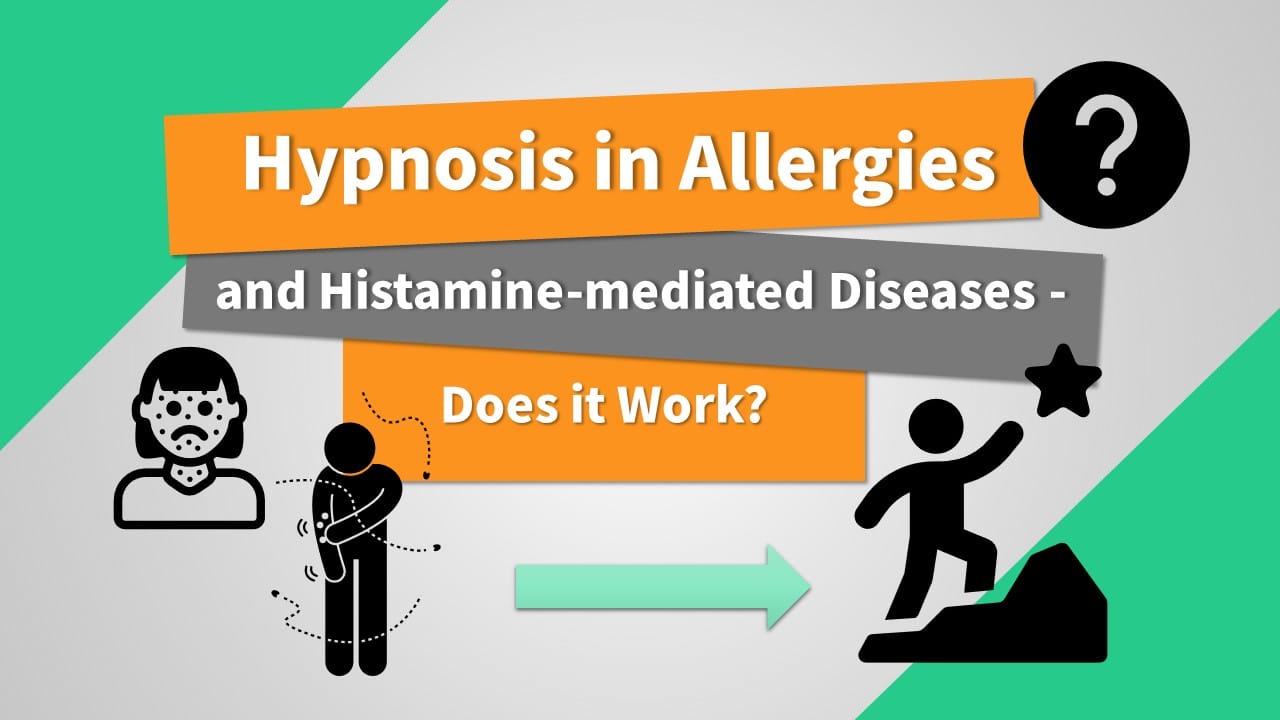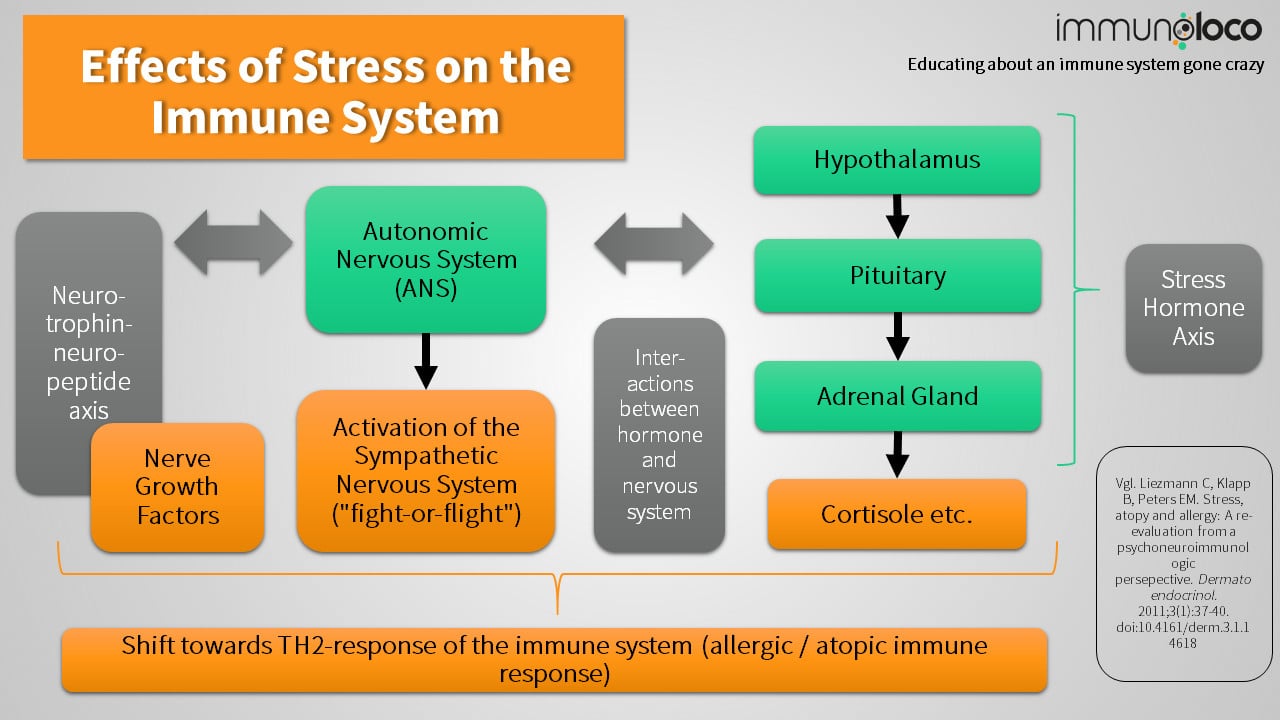
An interaction of psyche and especially atopic diseases or allergic diseases is often suspected. The discipline of psychoneuroimmunology picks up on this and shows how a change in stress hormone secretion or pain interferes with the immune system. This can create an unfavorable cycle, as in turn, the inflammatory messengers produced by stress and immune dysregulation can negatively affect emotional balance.1
Hypnosis has been shown in small studies to have a positive effect on the following symptoms and diseases:
- Hay fever
- Neurodermatitis / atopic dermatitis
- Urticaria
- Itchung
Psoriasis, an autoimmune disease, was positively influenced by hypnotherapy in smaller studues, which is why it is discussed in detail in the article on hypnosis in autoimmune diseases.
This article does not want to present atopic, allergic or mast cell mediated diseases as psychosomatic diseases that can be remedied by hypnosis only. Nevertheless, in this review, biological correlations between a stress response and the immune system are to be pointed out, and studies are to be compiled in which hypnotherapy positively affects allergy symptoms or the course of the disease.
This article is about a health issue. It is important that you have your symptoms examined and treated by medical professionals. This article is not intended to be, and cannot be, a substitute for the care and advice of medical professionals that may be available to you.
Hypnosis for hay fever and allergies
In a study of 66 hay fever patients, half of whom learned self-hypnosis techniques in the first year and the other half served as a control group, there was a significant improvement in allergic symptoms.2
The control group, which had not previously experienced hypnotherapy, was invited to learn self-hypnosis techniques in the second year: this also resulted in symptom relief in this group.
Likewise, nasal breathing improved under self-hypnosis, although the effect did not always reach statistical significance. The researchers saw the most significant improvement when patients hypnotized themselves after being exposed to grass pollen in a provocation test. The nose remained significantly clearer in some subjects under self-hypnosis than without.
Thus, under self-hypnosis, some of the participants were able to alter or influence their immune response. According to the authors, hypnosis and trance ability did not play a role in this study.2

Reduced histamine wheals during hypnosis
Another interesting study was conducted with 10 well-hypnotizable subjects, examining the skin response to a histamine prick test under pain stimuli and hypnosis.3
In a prick test, allergens are usually introduced into the top layer of the skin. Histamine is considered a control field, since a reaction to this tissue hormone is usually expected in the form of a wheal or redness
In the investigation set-up, the researchers wanted to examine the connections between pain stress stimuli and inflammatory processes and whether these can be influenced by hypnosis. Pain stimuli were applied by utilizing a laser.
The histamine wheal under hypnotic analgesia, i.e., pain relief by hypnosis, was significantly smaller than without hypnosis. This study also showed that pain/stress stimuli appear to play a role in skin inflammatory processes.3
Different skin responses to histamine when experiencing emotions such as anger, sadness, and joy
Different skin responses to histamine when experiencing emotions such as anger, sadness, and joy
Similarly, another experiment examined how emotions elicited under hypnosis affect skin responses in the histamine prick test. It showed that under the suggestion of joy, the response to histamine reached its peak after two minutes but took four minutes to its peak under sadness. Anger was also associated with a more prolonged and significant skin response than joy.4
Stress influences allergic diseases
People with allergies and mast cell diseases often also have the personal experience that strong anger or sadness negatively influences the condition. These aforementioned studies confirm interactions between the nervous system and the immune system.
For example, states of tension result in activation of the sympathetic nervous system, which is also known as the “fight and flight” state. Stressful stimuli also cause more stress hormones, including cortisol, to be released because our central hub for hormone regulation – the hypothalamus with pituitary gland – stimulates the adrenal gland to do so.
Nervous and hormonal systems interact with each other, and there is also a release of different nerve growth factors, which can increase inflammation. In general, this leads to a shift of the immune system towards an allergic immune response (TH2).

Subjects with a strong reaction to histamine seem to be particularly well hypnotizable
In addition to the already expected reaction that persons in a happy state had less severe skin reactions, another striking feature was found in the above mentioned study: subjects who were particularly well hypnotizable had stronger reactions to histamine in the skin prick test compared to persons who were not as receptive to hypnosis.4
However, it is still unclear why such a correlation might exist, and in addition to studies that have found this effect, there have again been those that have failed to demonstrate this correlation.1,3,4
Interestingly researchers found clusters of gene mutations affecting histamine degradation more frequently in people with atopic diseases, asthma, and migraine.5–8 hese so-called polymorphisms affect the histamine balance, which could affect the psyche and the susceptibility to hypnosis.
Hypnosis and hives (urticaria)
Urticaria is a skin disease characterized by wheal formation and the appearance of swellings, so-called angioedema. Often histamine, as one of the main triggering mediators, plays a major role in the formation of the symptoms of urticaria.
Suppose hypnosis affects the skin’s response under histamine provocation, as it did in the experiments mentioned above. In that case, it is at least likely that hypnotherapy could also be helpful in a proportion of patients with hives. In fact, there is a small study of 15 subjects with hives in which hypnosis was found to be effective. It had a particularly good effect on itching.9,10
Here, however, in contrast to the hay fever study, there was a difference between hypnotizable and rather non-hypnotizable subjects. But both groups benefited from the intervention. Hypnotherapy helped the people who were somewhat more susceptible to hypnosis slightly more in this setting.9
Use of hypnosis for atopic eczema
Atopic dermatitis, also known as atopic eczema or neurodermatitis, is a common chronic skin condition often associated with severely itchy skin.
In a study published as recently as 2020, the authors showed that 26 out of 27 sufferers with atopic dermatitis benefited from hypnotherapy. The symptom scale decreased from 12 at baseline to an average of 2.8 points at the last appointment.
On average, six hypnosis sessions were performed with each patient, with an individual range of 2 to 16 sessions. However, there was no control group.11

Summary
Hypnosis seems to have positive effects on allergic and atopic diseases. How significant the impact is and in whom hypnotherapy works particularly well is difficult to say since the studies often consisted of few participants and did not always include a control group.
In addition, as with almost all chronic illnesses, one has the problem that these usually fluctuate throughout a person’s life. For this reason alone, there can be improvements and deteriorations that have nothing to do with the intervention.
Also, not every person can be hypnotized equally well, and in the case of self-hypnosis, it depends greatly on how often patients use and practice the technique. Nevertheless, I consider hypnotherapy to be an exciting opportunity with practically nonexistent side effects if used correctly. It even gives the affected person the possibility, for example, in the context of self-hypnosis, to take action against their illness themselves.
My personal experience with hypnosis with histamine-mediated problems
As a hypnotherapist and sufferer of recurrent allergic reactions and angioedema, self-hypnosis can provide me with some relief with regard to distressing symptoms such as itching.
I am currently experimenting with forms of hypnosis that suggest to the patient what physical processes he/she should influence to improve their symptoms. Derzeit experimentiere ich mit Hypnoseformen, die dem Patienten bzw. der Patientin suggerieren, welche körperlichen Vorgänge er/sie beeinflussen soll, um seine Symptome zu verbessern.
I was inspired by a study of children with IgA deficiency. IgA deficiency is a comparatively common immunodeficiency. In this study, children were allowed to use self-hypnosis with suggestions of their choice to try to increase their IgA production. However, this was only successful in the group in which medically correct and specific suggestions were given. In this group, IgA levels increased significantly.12
Accordingly, in hypnotic interventions, I try to work with the biochemical processes in the body and give concrete suggestions. I am curious to see how this plays out and will report back.😊
References
1. Liezmann C, Klapp B, Peters EM. Stress, atopy and allergy: A re-evaluation from a psychoneuroimmunologic persepective. Dermatoendocrinol. 2011;3(1):37-40. doi:10.4161/derm.3.1.14618
2. Langewitz W, Izakovic J, Wyler J, Schindler C, Kiss A, Bircher AJ. Effect of self-hypnosis on hay fever symptoms – a randomised controlled intervention study. Psychother Psychosom. 2005;74(3):165-172. doi:10.1159/000084001
3. Zachariae R, Bjerring P. The effect of hypnotically induced analgesia on flare reaction of the cutaneous histamine prick test. Arch Dermatol Res. 1990;282(8):539-543. doi:10.1007/BF00371950
4. Zachariae R, Jørgensen MM, Egekvist H, Bjerring P. Skin reactions to histamine of healthy subjects after hypnotically induced emotions of sadness, anger, and happiness. Allergy. 2001;56(8):734-740. doi:10.1034/j.1398-9995.2001.056008734.x
5. Petersen J, Drasche A, Raithel M, Schwelberger HG. Analysis of genetic polymorphisms of enzymes involved in histamine metabolism. Inflamm res. 2003;52(1):s69-s70. doi:10.1007/s000110300059
6. Agúndez JAG, Ayuso P, Cornejo-García JA, et al. The Diamine Oxidase Gene Is Associated with Hypersensitivity Response to Non-Steroidal Anti-Inflammatory Drugs. PLoS One. 2012;7(11). doi:10.1371/journal.pone.0047571
7. García‐Martín E, Martínez C, Serrador M, et al. Diamine Oxidase rs10156191 and rs2052129 Variants Are Associated With the Risk for Migraine. Headache: The Journal of Head and Face Pain. 2015;55(2):276-286. doi:https://doi.org/10.1111/head.12493
8. Agúndez JAG, Luengo A, Herráez O, et al. Nonsynonymous polymorphisms of histamine-metabolising enzymes in patients with Parkinson’s disease. Neuromolecular Med. 2008;10(1):10-16. doi:10.1007/s12017-007-8017-7
9. Shertzer CL, Lookingbill DP. Effects of relaxation therapy and hypnotizability in chronic urticaria. Arch Dermatol. 1987;123(7):913-916.
10. Shenefelt PD. Mindfulness-Based Cognitive Hypnotherapy and Skin Disorders. American Journal of Clinical Hypnosis. 2018;61(1):34-44. doi:10.1080/00029157.2017.1419457
11. Delaitre L, Denis J, Maillard H. Hypnosis in Treatment of Atopic Dermatitis: A Clinical Study. International Journal of Clinical and Experimental Hypnosis. 2020;68(4):412-418. doi:10.1080/00207144.2020.1788391
12. Olness K, Culbert T, Uden D. Self-regulation of salivary immunoglobulin A by children. Pediatrics. 1989;83(1):66-71.
Immunoloco unterstützen
immunoloco möchte Betroffenen kostenlos gute und hilfreiche Informationen rund um ein verrücktes Immunsystem bieten. Du findest das gut? Dann unterstütze immunoloco und meine Arbeit doch gerne. Jeder Euro zählt und hilft, das Projekt weiterleben zu lassen.
